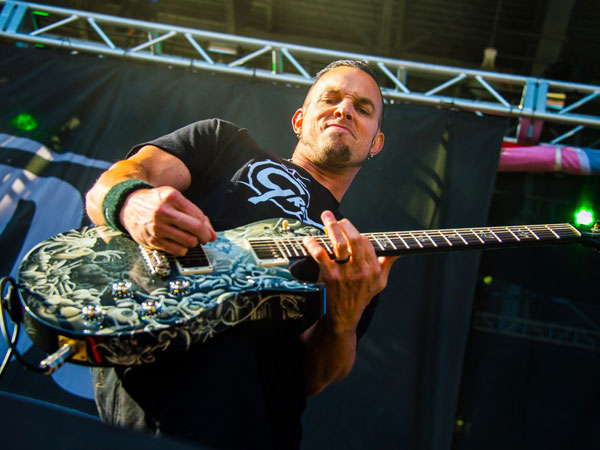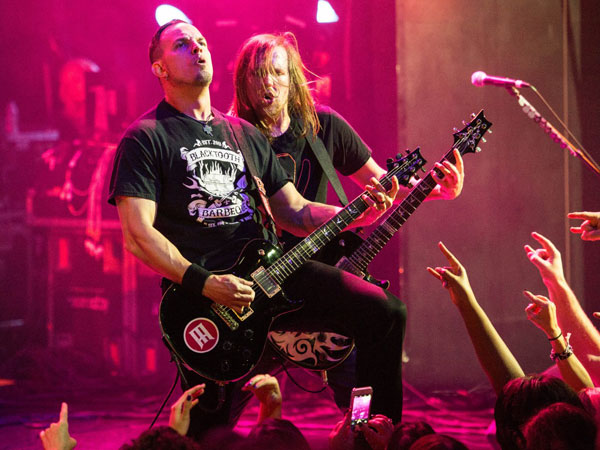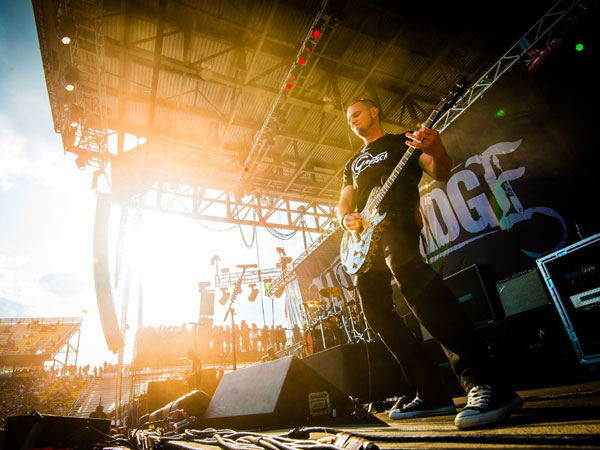Mark Tremonti: 16 ways to improve your playing
Tips-a-plenty from the guitar hero

Introduction
With new solo album, Cauterize, Mark Tremonti reminds us once again exactly why he is one of the finest axemen around today. Here, he shares the secrets behind that jaw-dropping musicianship and quest to evolve.
"His mastery of both lead and rhythm playing knows no bounds, it would seem"
Mark Tremonti is the definition of a modern guitar player. He is someone who has bought the mags, got the DVDs and spent a worrying amount of time locked away by himself with nothing but his metronome for company. And it shows.
Whether he’s crushing arenas with Alter Bridge or standing as frontman with his solo band, there is a consistency across the board. His mastery of both lead and rhythm playing knows no bounds, it would seem.
But, as he himself is quick to explain, there is no back-door route. If you want to be the best musician you possibly can be, it’ll take lots of discipline and even more thick skin to break through those inevitable hurdles unique to you.
For Tremonti, the path to enlightenment was one paved by continually pushing his boundaries and never giving in. And when we started picking his brain on what advice he can offer other players from the lessons he’s learned along the way, a whole wealth of inspirational insight came tumbling out...

It's okay to be a beginner
Don’t shy away from focusing on your weakest areas...
"I always feel like a beginner when I start a new technique or something I’m less familiar with.
"Right now, I’m actually trying to master some country-style picking"
"Right now, I’m actually trying to master the super-fast pentatonic stuff, as well as some country-style picking, like Brad Paisley [does].
"He has this one trick that he uses a lot and you don’t even know he’s doing it half the time. It’s an open-string pull-off where you double-pick, pull off and pluck. It’s such a cool technique and so smooth once you nail it."

Vocalise your leads
Tremonti tells his hands what he hears in his head, not the other way round...
"Just look at what David Gilmour does; he’ll hear it in his head first"
"I’ve done this a bunch of times - you choose your song, put your backing track on and you hum the solo exactly how you hear it in your head. Then go back and learn it on guitar! That’s a good first step.
"Just look at what David Gilmour does; he’ll hear it in his head first. You may not be able to come up with the flashy stuff doing it that way, but the memorable, melodic stuff will come out."

Picking is suffering
It’s better to have it and not need it than to need it and not have it...
"Work on the upstroke, because it’s the key to those super-fast pentatonic lines"
"I saw Joe Bonamassa live and was like, ‘That technique is ridiculous!’ But I didn’t want to just learn all his licks, so I came up with my own exercises, rolling through the patterns.
"Instead of doing descending [sextuplets and quintuplets], I’ll roll through however I see fit. Work on the upstroke, because it’s the key to those super-fast pentatonic lines.
I got to the point with legato where I wasn’t getting any better. So what’s next? Well, picking is suffering! What’s the hardest type? Two-note-per-string pentatonic fast!"

Don't forget about dynamics
Less can be so much more...
"If you don’t have dynamics, your music won’t really speak to people"
"Dynamics are incredibly important. If you have 14 heavy songs on a record, it’s not going to sound that heavy without parts that are mellow.
"You need that juxtaposition. Otherwise, it’s in one ear and out the other. We got about eight songs into Cauterize and then I had to stop with the heaviness.
"So then I wrote Sympathy, which had this U2 vibe to it, and then Dark Trip, with more of a fingerstyle, spooky sound. If you don’t have dynamics, your music won’t really speak to people."

Let it happen
You might just stumble on something...
"Think about it from the perspective of rhythm first and foremost"
"You’ll come across so much cool shit that might sound Egyptian or Chinese. That’s how I write and find things that haven’t been done before.
"Maybe try not thinking about what you’d write as a lead player, and think about it from the perspective of rhythm first and foremost."

Don't learn shortcuts
The hard way can be worth it...
"Joe Bonamassa chooses to do it the hard way and picks every note"
"I asked Bonamassa if he sweeps any of his fast pentatonic runs. He doesn’t! So that’s why no-one else sounds quite as aggressive; Joe chooses to do it the hard way and picks every note.
"His upstroke is insane. Once he was playing and then handed me the guitar... it was terrifying! If I sit with a guy that good, I don’t want to do anything but watch."

Get down
Why Hetfield had the right idea...
"The heavy-metal rhythm guitar approach addresses the right hand downstroke thing, which - believe me - is a whole skillset of its own.
"It really does help to cover your bases from the bottom up"
"If you work on that and start building a fast downstroke, then just think... you’ll be able to alternate pick twice as fast as that! Not every guitar player can master every technique, but it really does help to cover your bases from the bottom up."

The bedroom is not a stage
Bedroom shredders beware: real experience comes from the stage itself...
"As soon as you experience being on stage, it’s really different"
"You can spend all day long in your bedroom but as soon as you experience being on stage, it’s really different.
"Especially with doubling up on vocals in the solo band, I’m still learning how to do two different things at once. The most important thing for me is to try and make it as interesting as possible without losing the ability to play and sing."

Never stop improvising
The battle to think on the spot never ends...
"I do it daily, because if I just worked on technique, I’d suck at improvising!
"It’s not like riding a bike, you need to keep up with it"
"It’s hard to come up with something clever and unique when you’re working so hard to be perfect. I had all these backing tracks and was nailing all the changes and progressions.
"Then I stopped for a few years and I was terrible. It’s not like riding a bike, you need to keep up with it."

We all hit brick walls
How to overcome the creative drought...
"Go and learn something completely new. I know how it feels when I’m stuck in a rut: playing with no goal for the day against a backing track, playing the same old licks.
"Learn something different like a jazz solo, for example"
"Stop playing like that for a week and learn something different like a jazz solo, for example.
"I was learning some Robben Ford stuff the other day; it’s amazing what he can do with just a few notes. It’s all feel and phrasing. You have to put heart and soul into it."

Ditch the pick
You! Yes, you! It’s time to use your fingers...
"To improve my fingerstyle, what I did was learn Bach’s Bouree In E Minor. I didn’t even know the rhythm, I just had the tab, so I just played it as fast as humanly possible with two fingers.
"The main thing is to get that rhythm going with the thumb"
"Then I learned The Call Of Ktulu by Metallica and after that, Tesla’s Love Song. From there on, I was tucking my pick behind my second finger and using my thumb and third.
"The main thing is to get that rhythm going with the thumb. Do something like a 6/8 rhythm and float around the guitar in open D5 tuning. You’ll definitely come up with something different!"

Let the music breathe
Doing the unexpected will give your music much more identity...
"There are so many little tricks you can use"
"Especially if you’re playing over fast music, you have to let it breathe. Don’t make your first lick fast. Make it a bend or an overbend or some weird out-of-tune thing.
"There are so many little tricks you can use, like doublestops that go out of pitch if your guitar has a floating bridge. That shit sounds cool! Give it space to breathe and remain focused."

Learn from anyone you can
Be open enough to let inspiration come from unexpected places...
"Every time we go on tour, I find the guy from the other band and jam"
"I love sitting down with other players, regardless of how good anyone else thinks they are. I always ask for their top three real go-to licks. Most of the time they’re badass!
"It can surprise you, especially when it’s someone in a band that don’t have solos in their music. Every time we go on tour, I find the guy from the other band and jam. I did this with Clint Lowery from Sevendust. He showed me these awesome sliding licks!"

Invest in the right equipment
Get what you need for right now and think about later when you get there...
"When you’re starting out, get something fun with loads of effects"
"When you’re starting out, get something fun with loads of effects. The Line 6 Bogner Spider Valve HD100 was really affordable and sounded awesome.
"Then, when you really get serious about it, think about something more high range. It depends on what style you’re going for.
"I personally don’t like Marshalls. Even though they are great for the midrange bite, they’re not suited as well for the chuggy stuff. Put a Boogie or a Bogner next to a Marshall and duke it out... it will get eaten alive."

Keep listening
Find the inspiration to improve...
"I search online for new guitarists to inspire me, or I’ll run into people by accident.
"You can’t look at Joe Bonamassa and think, ‘Maybe I can catch that in a few years’"
"Like Bonamassa, I went to see his show and I realised how much work I had to do. You can’t look at him and think, ‘Maybe I can catch that in a few years.’ He’s been playing since he was four years old!
"You know who is a great shredder and teacher? Andy James. I bought his Nuno Bettencourt tutorial DVD and I started playing better than ever! He’s a sick player."

Play with class
It’s really all about heart and soul...
"People might think Guthrie Govan’s a shredder, but he’s got so much class"
"I would rather listen to someone like Brent Mason than the best of the shredders.
"That’s what I like about Guthrie Govan. People might think he’s a shredder, but he’s got so much class and emotion in his playing for a technique-driven player. That’s what I respect, that’s what I look for: someone who has heart when they play."
Amit has been writing for titles like Total Guitar, MusicRadar and Guitar World for over a decade and counts Richie Kotzen, Guthrie Govan and Jeff Beck among his primary influences. He's interviewed everyone from Ozzy Osbourne and Lemmy to Slash and Jimmy Page, and once even traded solos with a member of Slayer on a track released internationally. As a session guitarist, he's played alongside members of Judas Priest and Uriah Heep in London ensemble Metalworks, as well as handling lead guitars for legends like Glen Matlock (Sex Pistols, The Faces) and Stu Hamm (Steve Vai, Joe Satriani, G3).
